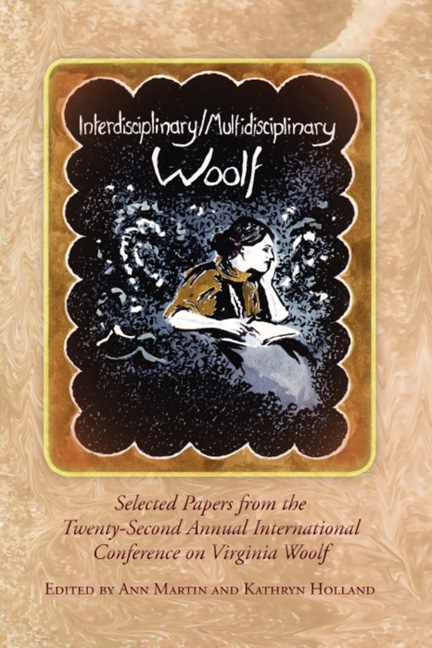Book contents
- Frontmatter
- Contents
- Introduction to Interdisciplinary/Multidisciplinary Woolf
- Acknowledgments
- List of Abbreviations
- History, Materiality, Multiplicity
- Patterns, Practices, Principles
- “Waving to Virginia”
- Woolf, Defoe, Derrida: Interdisciplinary dogs—or the canine aesthetics and (gender) politics of creativity
- “The law is on the side of the normal”: Virginia Woolf as Crip Theorist
- A Healing Centre of One's Own: Woolf's Legacy and Public Responses to Child Abuse
- Sunflower Suture: Disseminating the Garden in The Years
- “One Must Be Scientific”: Natural History and Ecology in Mrs. Dalloway
- Clarissa's Glacial Skepticism: John Tyndall and “Deep Time” in Mrs. Dalloway
- Apollonian Illusion and Dionysian Truth in Mrs. Dalloway
- Art, Influence, Embodiment
- Publishing, Politics, Publics
- Notes on Contributors
- Conference Program
Apollonian Illusion and Dionysian Truth in Mrs. Dalloway
from Patterns, Practices, Principles
- Frontmatter
- Contents
- Introduction to Interdisciplinary/Multidisciplinary Woolf
- Acknowledgments
- List of Abbreviations
- History, Materiality, Multiplicity
- Patterns, Practices, Principles
- “Waving to Virginia”
- Woolf, Defoe, Derrida: Interdisciplinary dogs—or the canine aesthetics and (gender) politics of creativity
- “The law is on the side of the normal”: Virginia Woolf as Crip Theorist
- A Healing Centre of One's Own: Woolf's Legacy and Public Responses to Child Abuse
- Sunflower Suture: Disseminating the Garden in The Years
- “One Must Be Scientific”: Natural History and Ecology in Mrs. Dalloway
- Clarissa's Glacial Skepticism: John Tyndall and “Deep Time” in Mrs. Dalloway
- Apollonian Illusion and Dionysian Truth in Mrs. Dalloway
- Art, Influence, Embodiment
- Publishing, Politics, Publics
- Notes on Contributors
- Conference Program
Summary
In “Bad Religion: The Irrational in Mrs. Dalloway,” Amy Smith notes that, “[i]n describing Septimus, Woolf makes multiple references to archaic religious figures, including Dionysus” (17), and refers to Nietzsche's characterization of the Dionysian to argue, “not only is Septimus a Dionysian figure, he is also a response to [the] modern situation of alienation from nature” (17). Though she convincingly relates Septimus and Dionysus to her examination of the irrational in Mrs. Dalloway, Smith stops short of discussing the relationship between Dionysian and Apollonian elements in the novel. Yet, in Nietzsche's formulation, the Dionysian is primarily important because of how it relates to the Apollonian, and throughout Mrs. Dalloway, Dionysian and Apollonian elements are continually juxtaposed. It is necessary to understand the tension between Apollonian illusion and Dionysian truth in Mrs. Dalloway because it partially explains the novel's focus on characters as different as Clarissa, whose social sphere is in danger of becoming wholly Apollonian, and Septimus, whose unmediated insight into the Dionysian proves fatal. Further, the struggle to balance Apollonian and Dionysian elements relates to one of the novel's principal social projects: if the society depicted in Mrs. Dalloway does not find a way to incorporate Dionysian truths into the Apollonian structures that create the illusions of meaning that make life seem to be worth living, it will not only risk continuing to alienate those, such as Peter, with a disposition towards the Dionysian, but will also fail the soldiers who are returning home with profound insight into horrific Dionysian truths. In short, by comparing the two strands of Mrs. Dalloway in light of Nietzsche's conception of Apollonian illusion and Dionysian truth, I will argue that the novel frames parallel struggles to balance Apollonian and Dionysian elements and highlights the importance of achieving such a balance—Clarissa's Apollonian sphere verges on vacuity without Dionysian truths, and Septimus's Dionysian truths can only lead to death without Apollonian illusion.
To examine Apollonian and Dionysian elements in Mrs. Dalloway, it is necessary to examine these two terms in some detail. In The Birth of Tragedy (1876), Nietzsche utilizes two Greek gods, Apollo and Dionysus, as the inspiration for these principles.
- Type
- Chapter
- Information
- Interdisciplinary/Multidisciplinary Woolf , pp. 138 - 142Publisher: Liverpool University PressPrint publication year: 2013



